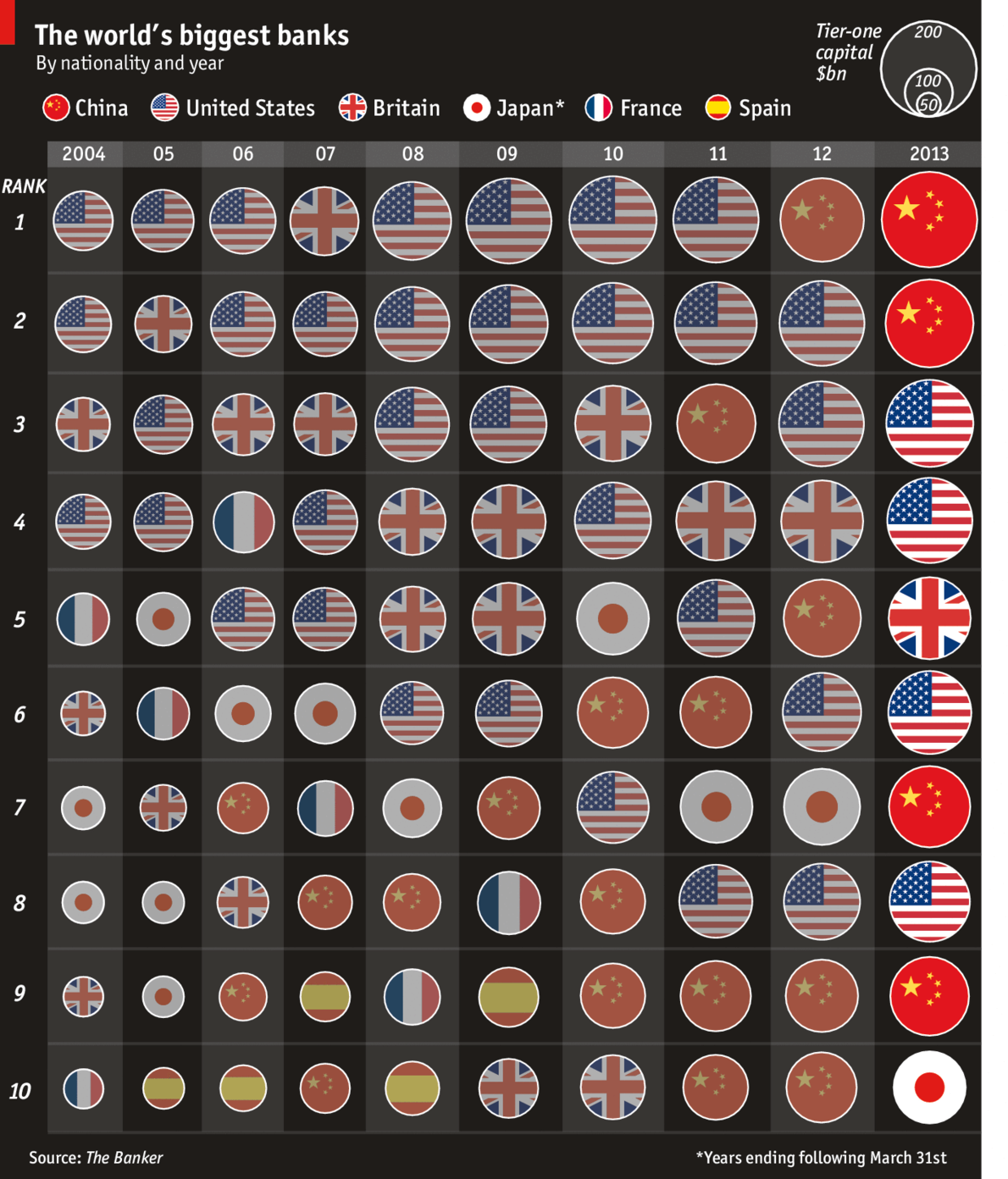2015年08月29日
中国の自殺の劇的な減少(3) 世界の上位銀行は商業地を変えている
Mr Yip and his fellow researchers wonder if this goes against a popular theory, based on the thinking of Emile Durkheim, a 19th-century French sociologist, that urbanisation, modernisation and socioeconomic gains lead to increased social alienation and a higher suicide rate. Some data support this view in the richer developed world, where suicide rates have been rising recently. The estimated global average has increased from 11.6 to as much as 14 per 100,000 since 2008. And China’s rich neighbours have significantly higher rates—South Korea’s in 2012 was 28.1 per 100,000, Japan’s was more than 21.
Yip氏と同僚の研究者は、この現象は、都市化、近代化、社会経済の進展は社会的疎外の増大、自殺率の上昇を引き起こすという19世紀のフランスの社会学者であるエミール・デュケームの考えに基づく通説に反するものだと考えている。近年、自殺率が上昇してきているより豊かな先進国では、この見解を裏付けるデータもある。世界平均の推計では、2008年以降、10万人当たり11.6人から14人に増加している。また、中国の豊かな隣国の自殺率は非常に高い。韓国は2012年に10万人当たり28.1人、日本では21人以上であった。
Yet China may be hitting a worrisome turning point as it ages and becomes more wealthy. Suicides rose slightly after the 2008 financial crisis, and may continue to do so if the economy slows more dramatically. The forces that shaped suicide’s decline in China—migration and rising urban living standards—are losing steam as well.
lose steam:勢いを失う/一息つく
しかし、中国は高齢化しより豊かになるのと共に、懸念すべきターニングポイントに近づいてきているのだろう。自殺数は2008年の金融危機の後、わずかに上昇しており、経済がより劇的に減速すれば増え続けるかもしれない。中国の自殺数の減少をもたらした出稼ぎ労働者と都市生活水準の上昇も同じように勢いがなくなっている。
Most worrying is that suicides remain high among the fastest-growing segment of society, the elderly, who kill themselves at rates ranging from 9.9 per 100,000 urban men aged 65-69 to 41.7 per 100,000 rural men aged 70-74. Suicide rates among the elderly generally dropped overall into the middle of the past decade—declining more in the cities than in the countryside—but the rates have been holding steady or resurging since 2008.
最も心配すべきは、最も急速に増加する層である高齢者で自殺数が高いままであることだ。高齢者の自殺率は、65〜69歳の都市男性の10万人当たり9.9人から70〜74歳の地方男性の10万人当たり41.7人にわたっている。高齢者全般の自殺率は、全体的では過去10年の半分に減っている(地方よりも都市での率が減っている)。しかし、2008年以降は現状維持か再上昇してきている。
The urbanisation and atomisation of the extended family, which led to a decline in suicides among younger generations, have left the elderly with fewer caretakers in the countryside and with few familiar faces in apartment blocks in the cities. The one-child policy has compounded this effect and will only make the burden heavier for the elderly and their children, just as the stresses of modern life are becoming more pronounced. Twenty years from now, the story of China’s suicide rate could be grimmer than it is today. But rates seem unlikely to return to the levels of the 1990s.
compound:悪化させる/度合いを増す
pronounced:明白な
grim:恐ろしい/厳しい
若年世代の自殺数を減少させた都市化や大家族の核家族化は、高齢者に対しては、地方ではわずかな介護者しかおらず、都市ではアパートでほとんど顔なじみがいないという状況を生んでいる。一人っ子政策はこうした効果を助長しており、高齢者と子供達への負担をより重くし、まさに現代生活のストレスとして、より明白になっていくだけだろう。今からの20年、中国の自殺率の話は今日より厳しいものになり得る。しかし、その率が1990年代の水準に戻ることはなさそうだ。
これはエコノミストだ。
Bigger big banks
Jun 30th 2014, 14:06 by L.P., R.L.W. and K.N.C.
より大きな大銀行
The world's top banks are changing their strips
世界の上位銀行は商業地を変えている
A DECADE ago, Europe counted five banks among the world's top ten. Today there is only one, HSBC. During that time Chinese banks not only made the list, but vaulted into the top two places, according to annual rankings by The Banker released on June 30th. Last year China Construction Bank shoved aside America's JPMorgan Chase to become second largest in terms of tier-one capital. ICBC (formerly known as Industrial and Commercial Bank of China) kept the top spot; with more than $200 billion, it is also the world's most profitable bank. Though Japan's Mitsubishi UFJ Financial Group is close to leaving the list altogether, until 2007 its $117 billion heft would have made it the world's biggest bank. Despite regulations designed to keep banks' ambitions modest so that none are too big to fail, today's groups are larger than ever. Global banking profits are at a record high of $920 billion—a third from Chinese banks alone.
vault into:飛び込む
shove aside:押しのける
heft:重さ
altogether:完全に
10年前、ヨーロッパは世界トップ10の銀行のうち5つを占めていた。今日、わずか1つ、HSBCのみだ。そのような時、6月30日に出版されたThe Banker誌の年間ランキングで、中国の銀行はリストに入るだけでなく、トップの2つの位置に飛躍した。昨年、中国建設銀行は、アメリカのJPモルガン・チェースを押しのけ、自己資本で世界第2位になった。ICBC(以前は中国工商銀行として知られていた)はトップの地位をキープした。2,000億ドル以上を持ち、世界で最も高収益の高い銀行だ。日本の三菱UFJ銀行グループはリストから完全に姿を消しかかっているが、1,170億ドルという規模は2007年までなら世界最大の銀行であった。大きすぎて倒産できない銀行がないよう銀行の野望を適度に保つことを目的とした規制にもかかわらず、今日の金融機関はかつてないほどに大規模になっている。世界的な銀行業の利益は過去最高の9,200億ドルを記録しており、中国の銀行だけでその3分の1を占めている。

土曜日。今日はこれまで。昨日の昼はインドシナ協会の勝部さんとグエンさんとの会食。午後はEdとAndrewの来社。夜は川崎の山本さんのところの天沼で石油会があった。今日は海野塾だ。ではまた明日。
Yip氏と同僚の研究者は、この現象は、都市化、近代化、社会経済の進展は社会的疎外の増大、自殺率の上昇を引き起こすという19世紀のフランスの社会学者であるエミール・デュケームの考えに基づく通説に反するものだと考えている。近年、自殺率が上昇してきているより豊かな先進国では、この見解を裏付けるデータもある。世界平均の推計では、2008年以降、10万人当たり11.6人から14人に増加している。また、中国の豊かな隣国の自殺率は非常に高い。韓国は2012年に10万人当たり28.1人、日本では21人以上であった。
Yet China may be hitting a worrisome turning point as it ages and becomes more wealthy. Suicides rose slightly after the 2008 financial crisis, and may continue to do so if the economy slows more dramatically. The forces that shaped suicide’s decline in China—migration and rising urban living standards—are losing steam as well.
lose steam:勢いを失う/一息つく
しかし、中国は高齢化しより豊かになるのと共に、懸念すべきターニングポイントに近づいてきているのだろう。自殺数は2008年の金融危機の後、わずかに上昇しており、経済がより劇的に減速すれば増え続けるかもしれない。中国の自殺数の減少をもたらした出稼ぎ労働者と都市生活水準の上昇も同じように勢いがなくなっている。
Most worrying is that suicides remain high among the fastest-growing segment of society, the elderly, who kill themselves at rates ranging from 9.9 per 100,000 urban men aged 65-69 to 41.7 per 100,000 rural men aged 70-74. Suicide rates among the elderly generally dropped overall into the middle of the past decade—declining more in the cities than in the countryside—but the rates have been holding steady or resurging since 2008.
最も心配すべきは、最も急速に増加する層である高齢者で自殺数が高いままであることだ。高齢者の自殺率は、65〜69歳の都市男性の10万人当たり9.9人から70〜74歳の地方男性の10万人当たり41.7人にわたっている。高齢者全般の自殺率は、全体的では過去10年の半分に減っている(地方よりも都市での率が減っている)。しかし、2008年以降は現状維持か再上昇してきている。
The urbanisation and atomisation of the extended family, which led to a decline in suicides among younger generations, have left the elderly with fewer caretakers in the countryside and with few familiar faces in apartment blocks in the cities. The one-child policy has compounded this effect and will only make the burden heavier for the elderly and their children, just as the stresses of modern life are becoming more pronounced. Twenty years from now, the story of China’s suicide rate could be grimmer than it is today. But rates seem unlikely to return to the levels of the 1990s.
compound:悪化させる/度合いを増す
pronounced:明白な
grim:恐ろしい/厳しい
若年世代の自殺数を減少させた都市化や大家族の核家族化は、高齢者に対しては、地方ではわずかな介護者しかおらず、都市ではアパートでほとんど顔なじみがいないという状況を生んでいる。一人っ子政策はこうした効果を助長しており、高齢者と子供達への負担をより重くし、まさに現代生活のストレスとして、より明白になっていくだけだろう。今からの20年、中国の自殺率の話は今日より厳しいものになり得る。しかし、その率が1990年代の水準に戻ることはなさそうだ。
これはエコノミストだ。
Bigger big banks
Jun 30th 2014, 14:06 by L.P., R.L.W. and K.N.C.
より大きな大銀行
The world's top banks are changing their strips
世界の上位銀行は商業地を変えている
A DECADE ago, Europe counted five banks among the world's top ten. Today there is only one, HSBC. During that time Chinese banks not only made the list, but vaulted into the top two places, according to annual rankings by The Banker released on June 30th. Last year China Construction Bank shoved aside America's JPMorgan Chase to become second largest in terms of tier-one capital. ICBC (formerly known as Industrial and Commercial Bank of China) kept the top spot; with more than $200 billion, it is also the world's most profitable bank. Though Japan's Mitsubishi UFJ Financial Group is close to leaving the list altogether, until 2007 its $117 billion heft would have made it the world's biggest bank. Despite regulations designed to keep banks' ambitions modest so that none are too big to fail, today's groups are larger than ever. Global banking profits are at a record high of $920 billion—a third from Chinese banks alone.
vault into:飛び込む
shove aside:押しのける
heft:重さ
altogether:完全に
10年前、ヨーロッパは世界トップ10の銀行のうち5つを占めていた。今日、わずか1つ、HSBCのみだ。そのような時、6月30日に出版されたThe Banker誌の年間ランキングで、中国の銀行はリストに入るだけでなく、トップの2つの位置に飛躍した。昨年、中国建設銀行は、アメリカのJPモルガン・チェースを押しのけ、自己資本で世界第2位になった。ICBC(以前は中国工商銀行として知られていた)はトップの地位をキープした。2,000億ドル以上を持ち、世界で最も高収益の高い銀行だ。日本の三菱UFJ銀行グループはリストから完全に姿を消しかかっているが、1,170億ドルという規模は2007年までなら世界最大の銀行であった。大きすぎて倒産できない銀行がないよう銀行の野望を適度に保つことを目的とした規制にもかかわらず、今日の金融機関はかつてないほどに大規模になっている。世界的な銀行業の利益は過去最高の9,200億ドルを記録しており、中国の銀行だけでその3分の1を占めている。

土曜日。今日はこれまで。昨日の昼はインドシナ協会の勝部さんとグエンさんとの会食。午後はEdとAndrewの来社。夜は川崎の山本さんのところの天沼で石油会があった。今日は海野塾だ。ではまた明日。
 RSS
RSS グローバル人材育成の道|海野惠一(元アクセンチュア代表)
グローバル人材育成の道|海野惠一(元アクセンチュア代表)